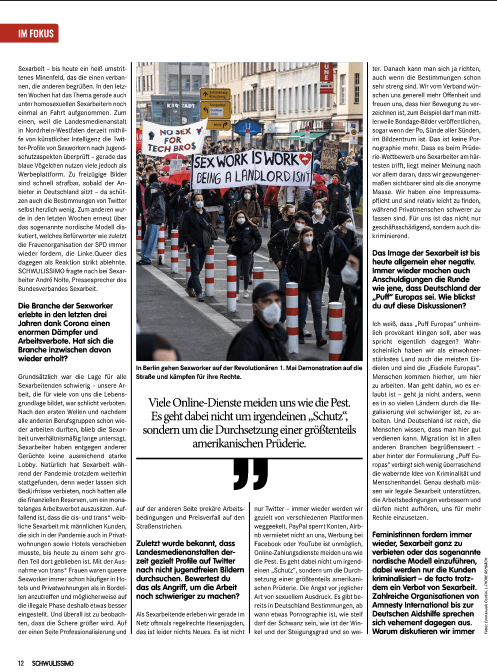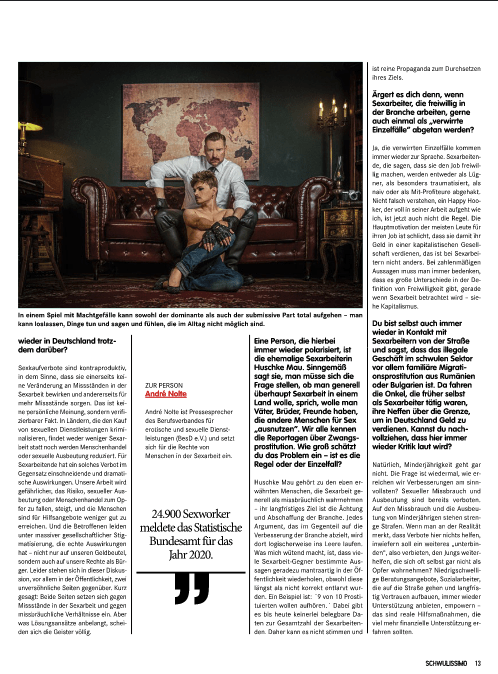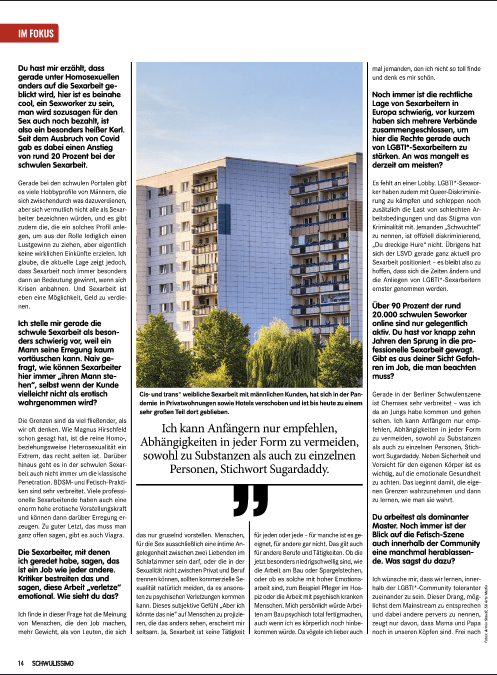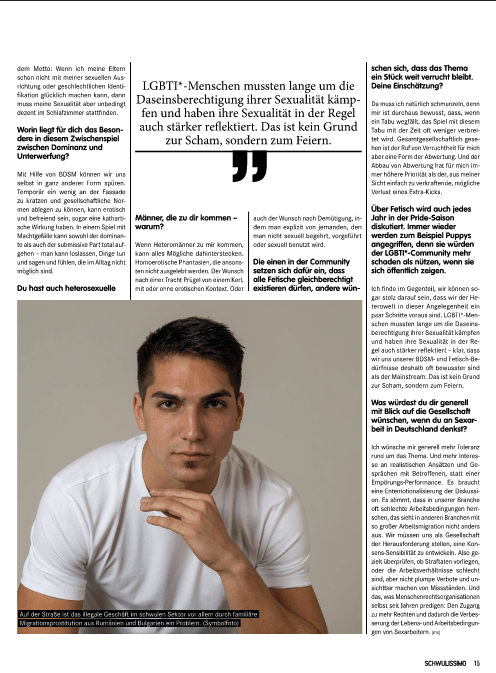„Sex work and the perceived bad reputation of BDSM in the LGBTI* community“ is published in the 05/2023 issue of Schwulissimo magazine. This is the transcript of the interview:
Sex work and the perceived bad reputation of BDSM in the LGBTI* community
Recently it came to light that sex workers‘ profiles on Twitter are being searched for allegedly illicit or adult images. Do you see this as an attack?
As sex workers, we often experience real witch hunts on the internet, which is unfortunately nothing new. It’s not just Twitter – we’re targeted by various platforms all the time. Paypal blocks accounts, Airbnb won’t rent to us, advertising on Facebook or YouTube is impossible, online payment services avoid us like the plague.
This is not about „protection,“ but about enforcing a largely American prudishness. The fear of any kind of sexual expression, the famous female nipple on Facebook. There are already rules in Germany about when something is pornography, how stiff the dick may be, what the angle and degree of inclination is, etc. You can follow these rules, even if they’re very strict. We from the sex workers‘ association would like to see more openness in general and are happy that there is movement here (e.g. you can now publish bondage pictures – even if the butt, (the sin of all sins ;-), is in the middle of the picture, it’s no longer pornography).
The fact that we sex workers are the hardest hit in the prudishness contest is, in my opinion, mainly due to the fact that we’re forced to be more visible than the anonymous masses. We’re required to have an imprint and are relatively easy to find, while private individuals are harder to catch. For us, this is not only detrimental to our business, but also discriminatory.
Even Joyclub – probably the most prominent swinger website in Germany – kicked us out a few years ago with the explanation that „venal lust has dubious side effects“. This seems to me to be an outgrowth of the Nordic Model faction: ban and look the other way instead of differentiating and finding real solutions.
At the same time, gays are showing once again that it’s possible to have private and commercial sexuality coexist peacefully. HUNQZ and ROMEO are clearly separated from each other and at the same time can be used by everyone. There are enough rules to prevent abuse (e.g. a sex worker can’t just quickly click through all Romeo profiles and leave random visitor taps to draw attention to his service). Nevertheless, all profiles, whether sex work or private, can communicate with each other.
The image of sex work tends to be negative. How do you see discussions like the one about Germany being the „brothel“ of Europe?
I know „Europe’s brothel“ sounds incredibly provocative, but what’s wrong with it? As the most populous country, we probably have the most ice-cream parlors, and we are the „ice-cream parlor of Europe“. People come here to work. People go where they are allowed to go – there’s no other way when it’s so much harder to work in so many countries because of illegalization. And Germany is rich, people know you can make good money here. German sex workers would not go to Bulgaria to earn more, they would go to Switzerland or Dubai.
In all other industries, migration is welcome – but behind the phrase „brothel of Europe“ lies, not surprisingly, the teeming idea of crime and human trafficking. This is exactly why we need to support legal sex work, improve working conditions, and not stop advocating for more rights.
Feminists keep calling for a ban on buying sex, most recently the SPD women’s organization. Many organizations are vehemently against bans. Why is the „Nordic model“ wrong, and why are we still discussing it in Germany?
Bans on buying sex are counterproductive in the sense that they do not change the abuses in sex work, and on the other hand they create more abuses. This is not a personal opinion, but a verifiable fact. In countries that criminalize the purchase of sexual services, there is neither less sex work nor less trafficking or sexual exploitation.
On the contrary, for sex workers, such a ban has drastic and dramatic effects: Our work becomes more dangerous, the risk of falling victim to sexual exploitation or trafficking increases, people are less accessible to offers of help. And those affected suffer massive social stigmatization, which has real consequences – not only for our wallets, but also for our rights as citizens.
Our political spokesperson, Johanna Weber, recently wrote about why this issue is being discussed again and again. Unfortunately, there are two irreconcilable sides to this discussion, especially in public.
In short, both sides are against abuses in sex work and abusive conditions. But when it comes to possible solutions, the opinions are completely different.
People who generally perceive sex work as abusive advocate for bans on buying sex, help and support to get out, and social ostracism of the trade. People who generally perceive sex work as work advocate for more rights and professional equality, social destigmatization of the trade, and empowerment.
Sex work as distinct from forced prostitution
One person who always polarizes is the former sex worker Huschke Mau. How big do you think the problem of forced prostitution or „exploitation“ is, is it a rule or an isolated case?
Huschke Mau is one of the people I just mentioned who sees sex work in general as abusive – her long-term goal is to see the industry outlawed and abolished. Any argument that aims to improve the industry will logically fall flat.
What makes me angry is that many anti-sex workers repeat certain statements in public like a mantra, even though they have long since been proven false. One example is: „9 out of 10 prostitutes want to quit“. But to this day, there are no verifiable figures on the total number of sex workers. Therefore, it cannot be true and is pure propaganda to achieve their goal. As Göbbels said: If you repeat a lie often enough, it becomes the truth.
You yourself said that the illegal business in the gay sector is mainly family migration prostitution. Can you understand that there is criticism to stop something like that?
Of course, minors are out of the question. Again, the question is: How do we achieve improvements in the most meaningful way? Sexual abuse and exploitation is already prohibited. There are severe penalties for abuse and exploitation of minors.
If we know that prohibition doesn’t help, how can another „prevention“ help the boys, who often don’t even see themselves as victims? Low-threshold counseling, social workers who go out into the streets and build up trust over time, who offer support again and again, who empower – these are real help measures that should receive much more financial support.
I think to myself, they don’t do this completely voluntarily, and often they’re not even really gay. Or am I looking at it the wrong way? Of course there can be family pressure or something else behind it. From the outside it is very difficult to get at, see previous question.
As far as „not really gay“ is concerned, and here I’m referring to adult sex workers, there are various methods that help, but I’ll expand on this more below.
Critics deny that people enter sex work voluntarily – they speak of „confused individual cases“. What do you think, what percentage is voluntary, how many are not?
Yes, the case of the „confused individual“ comes up all the time. Sex workers who say they work voluntarily are either labeled as liars, particularly traumatized, naive, or co-profiteers.
Don’t get me wrong, a happy hooker like me, completely absorbed in his work, is no longer the norm. Most people’s main motivation for their work is simply to make money in a capitalist society, and sex workers are no different.
As mentioned above, there are no verifiable figures for the total number of sex workers. When making numerical statements, one must always keep in mind that there are big differences in the definition of voluntariness, especially when it comes to sex work – see capitalism. And it’s also difficult to say at what point someone is considered a sex worker. Many full-time sex workers do not officially register out of fear of repression, many work part-time or on and off.
Gay sex work
How voluntary do you think the work situation is for gay sex workers? And how do gay sex workers see the current situation?
Yes, in male-male sex work, according to an evaluation by HUNQZ, there has been a disproportionate increase in profiles – compared to previous years. However, especially on gay portals, there are a lot of hobby profiles of men who earn extra money in between, but probably not all of them would call themselves sex workers, or those who create such a profile just to get pleasure from the role, but don’t actually earn any real income.
But I think the current situation shows that sex work is still very important, especially in times of crisis. And sex work is a way to make money. What I find worrying is that the pandemic and the bans have led to a trend towards isolation – which of course also worsens the general accessibility in terms of counseling, protection and education.
I imagine that gay sex work is particularly difficult. Naively asked, how can sex workers always „hold their ground“?
The boundaries are much more fluid than we often think, it’s not that hard for even the toughest gays to touch a woman’s breast. As Magnus Hirschfeld said, pure homosexuality or heterosexuality is an extreme that is quite rare. If we listen to ourselves, we know that, we are just constantly conforming for the sake of simplicity and sorting ourselves out for the outside world.
Also, gay sex work is not always about classic penetration. BDSM and fetish practices are very common, licking feet, being allowed to smell underpants, findom… There are also times when porn with women is inserted or watched on a cell phone, while on the other side of the glory hole, someone is taking acting. Many professional sex workers also have an enormously high erotic imagination and can then generate excitement about it. Last, but not least, there is Viagra.
Critics say that sex work „hurts“ inside. What do you think about that?
I think that the opinion of people who do the work is more important than the opinion of people who think it’s creepy. People for whom sex should be exclusively an intimate affair between two lovers in the bedroom, or who can’t separate the private and the professional in their sexuality, should of course avoid commercial sex work – that it can otherwise lead to psychological damage.
It seems strange to me to project this subjective feeling of „but I could never do that“ onto people who see it differently. Yes, sex work is not an activity for everyone or anyone – for some it is suitable, for others not at all, regardless of whether it’s the dream job or the best available option.
The same is true for other professions. They may be very low-key, such as construction or asparagus staking, or they may be highly emotional, such as hospice care or working with the mentally ill.
Construction work – hard physical labor, out in the rain, rough handling – would completely destroy me psychologically, even if I could possibly do it physically. I’d much rather fuck someone.
The legal situation for sex workers in Europe is difficult. What do LGBTI* sex workers lack the most?
There is no lobby. If you compare the representation of sex workers – straight and queer – with e.g. the LSVD (Lesben und Schwulen Verband Deutschland, Germany’s lesbian and gay association) with almost 5000 members, it’s not surprising that soccer stadiums glow in rainbow colors rather than a red umbrella being projected on the Brandenburg Gate.
LGBTI* sex workers struggle with queer stigma and carry the additional burden of poor working conditions and the stigma of criminality. Calling someone a „faggot“ is officially discriminatory, „you dirty whore“ is not. Incidentally, the LSVD has just adopted a pro-sex work position – so let’s hope that times will change and the concerns of LGBTI* sex workers will be taken more seriously.
Sex work in the fetish scene
Sometimes the view of the fetish scene is still condescending – from outside but also from within the LGBTI* community. What do you think about that?
I’d like us to learn to be more tolerant of each other within the LGBTI* community. This urge to conform as much as possible to the mainstream, while calling others perverts, just shows that mom and dad are still in our heads.
If I can’t make my parents happy with my sexual orientation or gender identification, then my sexuality must necessarily take place discreetly in the bedroom. So „straight acting“ in a single-family home with a white picket fence, 1.7 children, and a Golden Retriever.
We know this reflexive shaming from gay men who pretend to be more feminine. The hater in us wonders: Why doesn’t he pay the price I had to pay to be accepted?
What do you think is so special about the game of dominance and submission?
I once wrote in one of my columns that BDSM allows us to feel ourselves in a completely different way. Scratching the surface a bit and getting rid of social norms can be erotic and liberating, even cathartic.
In a game with a power imbalance, both the dominant and the submissive can be totally absorbed – you can let go, do, say and feel things that aren’t possible in everyday life.
What’s behind the fact that you have straight men as clients who want to be dominated by you?
When straight men come to me, it can be anything. Homoerotic fantasies that aren’t lived out otherwise. The desire to be beaten by a man, with or without an erotic context. Or even the desire for humiliation by being explicitly paraded or sexually used by someone you don’t sexually desire.
Some in the community advocate that fetishes be allowed to exist on an equal footing. Others would like to keep the subject a little dirtier. What is your opinion?
It makes me smile, of course, because I’m well aware that when a taboo is removed, playing with that taboo often becomes less prevalent over time. For example, the teacher/student game that used to be so popular in domina studios is no longer requested as often, mostly by older clients who were physically punished as children in boarding schools or schools. Today the teacher is not the respected person he used to be.
From the point of view of society as a whole, the reputation of wickedness towards BDSM/fetish, for me, is a form of devaluation. And the reduction of devaluation always has a higher priority for me than the possible loss of an extra kick, which from my point of view is easy to cope with. The attraction of the game remains, and what is particularly touching or shameful for the individual and then eroticized is very individual anyway.
Fetish is also always criticized in the community, for example when the pride season starts. What is your opinion?
I think we can even be proud that we’re a few steps ahead of the heterosexual world in this matter.
LGBTI* people have had to fight for the right of their sexuality to exist for a long time, and have usually been more reflective of their sexuality – it’s clear that we’re often more aware of our BDSM and fetish needs than the mainstream. This’s not a cause for shame, but for celebration.
I can imagine some gay men dreaming of quick extra income. What advice would you give to men who are seriously considering this step, are there any dangers to be aware of from your point of view?
Especially in the Berlin gay scene, chemsex with Tina, coke, GHB and the like is very common – I have seen guys come and go… I can only recommend to beginners to avoid dependencies in any form – to substances as well as to single persons, i.e. sugar daddy. In addition to taking care of your body, it’s important to take care of your emotional health. This starts with recognizing your own boundaries and then learning how to maintain them.
You told me that more and more clients are eager to have a sexual experience with queer people. Are heterosexual clients suddenly more liberal in their outings?
No, sexuality has always been multifaceted, just like gender identity. Today, thanks to greater visibility, we’re just more aware that the world isn’t as heteronormative as some conservatives would like it to be. The options have not always been so tangible, the internet makes it possible.
Closing remarks
What would you wish for society in general when you think about sex work in Germany?
In general, I’d like to see more tolerance around the topic of buying and selling sexual services. And more interest in realistic approaches and talking to those affected, instead of outrage performances. We need to de-emotionalize the discussion.
It’s true that our industry often has poor working conditions, it’s no different from other industries with such large labor migrations. As a society, we have to face the challenge of developing a consensus sensitivity. In other words, we need to look specifically at whether crimes have been committed or whether working conditions are poor, but not to impose crude bans and make abuses invisible.
And what human rights organizations, anti-trafficking associations, academics and sex workers themselves have been preaching for years: Access to more rights and the improvement of the living and working conditions of sex workers.






